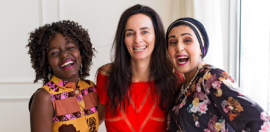Using Your Entrepreneurial Hat
10 April 2014 at 11:16 am
Not for Profits are looking more and more into innovative ways to improve income streams, one of which is through social enterprise. The presentation “Let’s Talk Business”, as part of the Givewell Forum for Purpose, looked at how NFPs can succeed in maintaining a social enterprise.
Journalist Freyla Ferguson attended the Forum.
Sticking to Purpose
“We all know that the social problems are going to keep growing, and waiting for the dollars to come in will take time and while we’re waiting people are suffering,” Family Life’s Director of Community Relations Judy Latta said.
“So we’ve taken the view that big opportunity exists if we collectively put our creative entrepreneurial thinking hats on and try to develop our own solutions our own way of funding solutions for these social problems.”
A Not for Profit that assists families, children and young people, Family Life’s purpose is for every child and every young person has the right to do well in life.
“Our focus is on strengthening families so that they can be the best they can be and we do that with counselling and education support,” Latta said.
“We have a $10 million income, 120 staff, and 400 volunteers, and we’re working in the southern suburbs of Melbourne.”
Latta said to overcome youth unemployment, the Family Life came up with the plan of opening opportunity shops, where youth could gain training, work experience and skills to help them find work.
“Our solution was to look at a community model, a business model of setting up opportunity shops and then the young people could come into the community shops and get work experience, skills and training,” she said.
“Their lives have gone up. And our volunteers, the retired baby boomers, can wrap their arms around these young people and give them support.”
After going bankrupt in 1979, Melbourne YMCA, now YMCA Victoria, went through a regeneration through the 1980s, according to its Chief Financial Officer Colin Organ.
"Our regeneration through the 1980s had been focussed around how do we become financially sustainable to actually deliver our services and our programs to those in need,” he said.
Now, for youth services Not for Profit YMCA Victoria, 80 per cent of its income comes from social enterprises.
“We’re very much in the camp of moving away from government funding, it’s not that we don’t seek government funding but knowing we want to be sustainable long term and we want to run our programs year in, year out,” he said.
“Our former chair puts it well… you need to have business brain with a charitable heart. When you do that it’s all about adopting business principles, taking business learnings but continually applying a mission and vision filter to everything you do.”
Know and Understand Your Core Business
Colin Organ said when YMCA Victoria started looking at social enterprise, they spent time working on development framework.
“Part of the development framework is to take an idea right from incubation to business case potentially to a board to post implementation – bringing a structured business approach to our social enterprises,” he said.
“That’s been adopted from taking business models and adapting them to the charitable sector.”
He said the organisation used the McKinsey Matrix model, which many conglomerates use to assess what areas of their operations they should grow and what areas they should stop and close.
“When we first looked at [social enterprise] operating across 11 sectors, we certainly found that as we evaluated that we asked ourselves the questions – what do we do well and in which of these sectors that we operate do they have a tail wind or a head wind, where do we most likely have the best impact?” he said.
“We certainly found in our operations some real upsides in our camping operations and in our learn to swim.”
Learn and Grow from Mistakes
However, Organ said there were also many challenges and for YMCA Victoria it was in developing social enterprise ideas around affordable housing.
“We felt that of those lists, we decided to stop and close our housing provider status,” he said.
“We felt that given our skillset we could get the best impact from our learn to swim and camping areas but we could not deliver the same outcomes in the affordable housing sector.
“They’re challenging decisions because naturally you want to help everyone, you want to be able to do good things but we had to be realistic, where were we going to get the best impact?
“In those development frameworks we also included all our ‘never forget lists’, when you have failures in social enterprises, once you’ve got through those processes, document your failures and build them into your procedures.
“We’ve learnt a lot from a few failures we had, there’s a bit of scarring there I guess as well from losing money from those environments and not achieving outcomes.
“But that’s actually given us the impetus to build it into our procedures, so any new social enterprise then has to focus on have we met this criteria, have we met these guidelines, have we considered these things?”
Family Life’s Judy Latta also said it hasn’t all been smooth sailing.
“We’ve learnt alot. We’ve had to struggle between social mission and business acumen,” he said.
She said the first shock was when the organisation opened its store in the Melbourne suburb of Cheltenham.
“A year later we’d made $30,000 in sales and the rent was $30,000 and that’s not sustainable – we’d gone in there with our heart and a little bit of business,” she said.
“We’ve had to turn around our thinking, still holding true to our mission and our purpose but reframe our thinking.
“We’re focussing now on shops with a business purpose, where are we going to make money, who are our best sales people, when we’ve got the profit coming in then we can take that back into supporting young people.”
She said Family’s Life’s finance managers were also pushing for every staff member to do training to understand profit and loss statements.
“It’s a big thing but it’s critical if we are going to play in this space of business and social enterprise,” he said.
She also said Family Life had tended to recruit internally, however that isn’t always necessarily the right move.
“In terms of opening social enterprise we’ve sometimes recruited internally, this particular person has a great heart, is a great social worker, and when she was younger she worked in a retail store, that may work but it’s likely not to work,” she said.
“The best strategy we feel is to go outside and look for someone who has good strong business skills. Someone who can come in and get the business pumping … then bring in the social worker aspect.”
Eyes Wide Open
“If you’re moving into social enterprise, feel comfortable with talking dollars, feel comfortable with saying we have to make money it might be that you have to train your staff to sell, sell, sell or that they need to be financially literate,” Latta said.
“These are our lessons that we hadn’t done earlier on.”
For YMCA Victoria’s Colin Morgan it’s important to understand profit and loss, and the balance sheet.
“It’s important to know you have the cash and sustainability there,” he said.
“Make all your decisions based on cash flow because that’s really the one that’s going to determine your stability.”
The next Givewell Forum for Purpose: Redefining the Social Sector will be held in Adelaide on April 11. For more information, click here.







